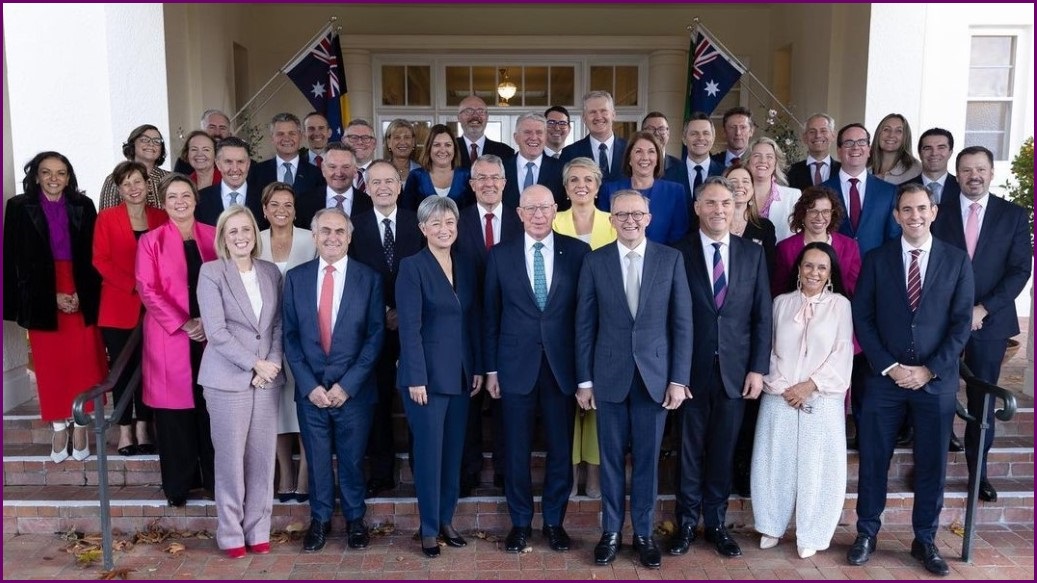Prime Minister Anthony Albanese’s newly-appointed Cabinet has elevated the status of cyber security and entrusts tech-related policy to several Labor ministers known for their long-term advocacy around skills development, tech policy, communications, and more.
The new Cabinet was sworn in on Wednesday with a number of firsts – including the appointment of 10 women as Cabinet members and 19 frontbenchers all told, as well as the first two Muslim ministers – with an “exciting” team that Prime Minister Anthony Albanese said is “overflowing with talent, with people who are absolutely committed to making a difference”.
“We are pleased to see the talented line up of ministers in the first Albanese government and look forward to working with them to deliver on their election commitments to grow Australia’s technology workforce,"said ACS President, Dr Nick Tate.
“The technology sector is critical in delivering the government’s aim of helping Australians gain secure, well-paid jobs and ACS will be approaching the new ministers at the upcoming Employment Summit with a range of measure to get more people into technology roles,” Dr Tate said.
However, ACS is disappointed that a new stand-alone digital economy ministry hasn’t been created in cabinet, Dr Tate added.
“The Digital Economy portfolio was an important part of our 2022 Election Platform and was one of nine proposals to boost Australia’s technology sector. We hope that during the term of this government the sector gets the cabinet-level recognition that such a critical part of the economy deserves.”
Among the newly appointed ministers are many faces that will be familiar to tech-industry watchers and executives.
Former telecommunications and competition lawyer and new Minister for Communications Michelle Rowland, for example, spent years shadowing former Communications, Cyber Safety and the Arts Paul Fletcher – and will now be charged with executing on Labor’s plan to revive the NBN by expanding fibre broadband to 1.5m more premises.
Ed Husic – a long-time innovation advocate who previously served as Parliamentary Secretary under Prime Minister Kevin Rudd in 2013 – takes the helm as Minister for Industry and Science, where he will be working to make good on his long-espoused ambitions to democratise innovation and increase government support for meaningful innovation.
Even as Husic and Rowland step out of the shadow roles they occupied for years, the appointment of Clare O’Neil as Minister for Cyber Security and Minister for Home Affairs marks a significant new policy by elevating Cyber Security to its own ministerial role for the first time.
With cyber security concerns barnstorming Australian boardrooms, CISOs admitting they aren’t up to the task and nation-state cyber conflicts threatening Australia’s critical infrastructure, Albanese’s decision to separate the ministry reflects a new normal in which O’Neil will work across industry and government to bolster the nation’s overall cyber resilience.
A fillip for STEM education?
A series of other appointments could indirectly benefit the sector with the likes of Jason Clare, whose previous shadow ministries include Communications, Trade and Investment, Regional Services, and other portfolios.
Clare’s role as an advocate for technology investment could help him shape more effective strategies for STEM teaching and learning across the Australian curriculum, with recent research confirming that resolving the IT skills gap will require new approaches to engaging students early on.
Ditto Brendan O’Connor, the new Minister for Skills and Training – whose previous roles in areas like Privacy and Freedom of Information, Small Business, Employment and Industry, and Science should see him and Clare reading from the same page as the new government works hard to resolve ongoing skills shortages in cyber security and IT overall.
Also set to do some thinking differently will be Bill Shorten, a former Labor leader and Minister for Education who will assume oversight of the National Disability Insurance Scheme (NDIS) and righting the Minister for Government Services portfolio, previously headed by Stuart Robert, which oversaw the Robodebt debacle and embarrassing service disruptions due to its ham-fisted digital-transformation agenda.
Similarly, the broad portfolio experience of new Minister for Climate Change and Energy Chris Bowen – who has previously helmed ministries including Competition Policy and Consumer Affairs, Small Business, and Tertiary Education, Skills, Science and Research – hints at a heavily technology-driven response to climate change.
Also likely to influence the new government’s tech-industry engagement are the likes of new Minister for Small Business Julie Collins – a former Standing Committee on Communications member – and Minister for Defence Richard Marles, whose previous roles in Science, Innovation and Industry will have made him well aware of the importance of those areas in bolstering Australia’s defence capabilities.
“We need new policies to tackle the huge shortage of talent that is crippling the cyber industry,” said David Fairman, a former NAB chief security officer who now serves as a Deakin University adjunct professor and chief technology officer with cybersecurity company Netskope.
“We are seeing everyday companies that cannot advance their digital resilience capabilities because they simply do not have the resources, and the country has a huge backlog of missing talents in the sector. Any policy designed to cultivate an ecosystem that will accelerate, develop and nurture talent locally would be welcome.”










